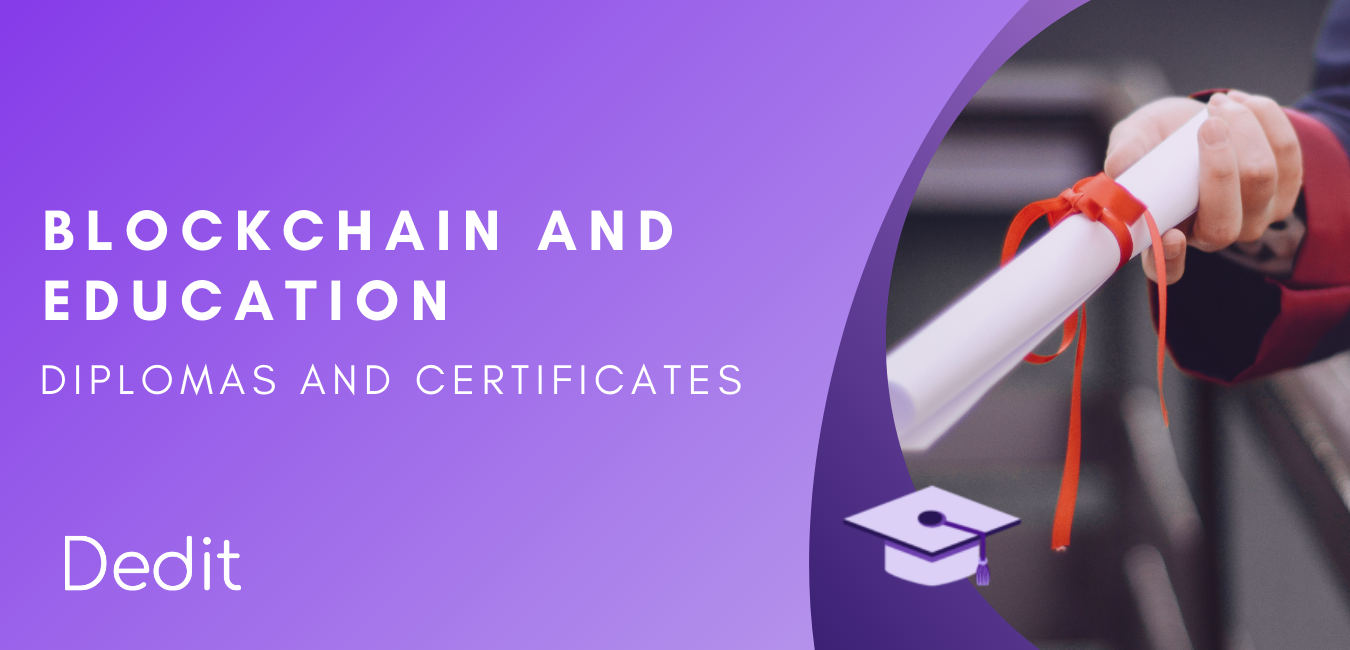
BLOCKCHAIN AND EDUCATION
The health emergency has changed all forms of social interaction and made it essential to use alternative digital methods to avoid any form of contagion.
The implementation of distance learning has undoubtedly accelerated digitalization in the world of education as well.
In such a context, it is necessary to promote solutions that can provide alternative mechanisms for the certification of competencies and that can guarantee the authenticity and integrity of diplomas or degree certificates. The latter, whether on paper or in digital format, are easily forged or altered.
WHY BLOCKCHAIN?
Thanks to blockchain, students can guarantee the authenticity and integrity of their digital certificates to potential employers all over the world, simply and immediately.
Authenticity, Integrity and Universality
It is not simply a matter of having a digitized copy of a paper certificate, but of guaranteeing the digital file certain properties typical of data recorded on the blockchain.
The decentralized security of the blockchain is an advantage for students, for certification bodies, but also for employers, providing them with an easy way to verify the educational credentials of candidates.
AUTHENTICITY
Thanks to the computer “signatures” of the data uploaded on the blockchain (of transactions), it is easy to trace the public address of the body that released and recorded them, without the need for complex verification operations.
UNIVERSALITY
The Blockchain has no geographical boundaries and allows for the authentication and verification of certificates and official documents in an open, secure and transparent manner, in any country.
INTEGRITY
Due to the decentralized nature of the blockchain, both in terms of governance and geographical distribution of nodes, and the unique system of creating concatenated blocks and time-stamping, the data recorded on the blockchain cannot be tampered with and cannot be modified in any way after the fact. By registering a file on the blockchain (remember that you do not put the document itself on the blockchain, but a code called a hash that uniquely corresponds to it), you also transfer the properties of immutability from a certain date and time to the file in question.
A manipulated file is easily identifiable if the original was notarised. Any modification of the file, however small, would exponentially change the hash, which therefore guarantees the integrity of a file.

OUR SOLUTION
All you need to do is access the Dedit.io portal to easily verify the authenticity of notarised qualifications or certificates in the blockchain. Dedit is a web platform that allows you to interact and write on the blockchain in a simple and secure way.
HOW DOES IT WORK?
The platform allows schools or certifying bodies to provide proof of paternity, immutability and integrity to the certificates they issue, through the use of the Algorand blockchain, excellent public and permissionless protocol created by Silvio Micali, a well-known computer scientist, winner of the Touring Prize and professor at Boston MIT.
The platform provides a corporate account, or ‘wallet’, that can be used by education providers to notarise students’ diplomas in an easy and intuitive way.
Once the diploma or certificate is registered, the unique fingerprint of that document is calculated, the so-called Hash value mentioned above. This, by its mathematical nature, does not allow any information to be retrieved from the original document, thus preserving users’ privacy.
From the same portal, anyone can easily verify that the diploma or certificate in question is the original one issued by the school, without viewing sensitive data.
Dedit.io offers a smart, simple and friendly procedure to guarantee the authenticity of qualifications. It also helps schools and training providers to efficiently and securely store all original certificates, with an optional encrypted storage function.
Furthermore, thanks to the multi-signature function, the training provider can also enable the student to download the original file and invite the student to sign for acceptance of the transaction generated by the notarization of the certificate.
Thanks to the use of this innovative technology in the education sector, it would be desirable to define a single interoperability infrastructure for the creation of an ecosystem in this area as well, to guarantee the effectiveness, cost-effectiveness, efficiency, publicity and transparency of academic and social life.
PROVISIONS
The use of blockchain technology for the storage of a computer document is provided for in the Italian legal system with the promulgation of Decree-Law 135.2018, which recognizes its legal effects of electronic time validation.
The decree-law in question, reads, “3. The storage of a computer document through the use of technologies based on distributed registers shall produce the legal effects of electronic time validation referred to in Article 41 of EU Regulation No. 910/2014.
- Within 90 days of the entry into force of the law converting the decree-law, the Digital Italy Agency shall identify the technical standards that technologies based on distributed registers must possess in order to produce the effects referred to in paragraph 3″.